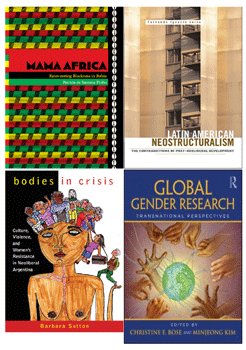LACS, Women's Studies Host Book Signing
 |
The departments of Latin American, Caribbean and U.S. Latino Studies and Women's Studies will host a book signing on March 24 at the UAlbany bookstore. |
UAlbany's Departments of Latin American, Caribbean, and U.S. Latino Studies and Women's Studies will host a book signing in the University at Albany Bookstore on March 24 at 6 p.m.
The event features new scholarly books by professors Fernando Leiva, Patricia Pinho, Christine Bose and Barbara Sutton, who will be on hand for the signing and to discuss their works.
Recent electoral victories by progressive governments in Latin America promising economic growth, social equity, and political democracy raise a number of questions, including: What are the key strengths and weaknesses of the emerging paradigm? What kinds of transformations can this movement enact? In Latin American Neostructuralism: The Contradictions of Post-Neoliberal Development, Leiva analyzes neostructuralism, and questions its credibility as the answer to the region's economic, political, and social woes.
Often called the "most African" part of Brazil, the northeastern state of Bahia has the country's largest Afro-descendant population and a black culture renowned for its vibrancy. In Mama Africa, Pinho examines the meanings of Africa in Bahian constructions of blackness. Combining insights from anthropology, sociology, and cultural studies, Pinho considers how Afro-Bahian cultural groups, known as blocos afro, conceive of Africanness, blackness, and themselves in relation to both.
Born and raised in Argentina and still maintaining significant ties to the area, Sutton examines the complex, and often hidden, worlds of diverse women in that country during a period of profound social upheaval. Set post-2001, Bodies in Crisis illuminates how multiple forms of injustice converge in and are contested through women's bodies. Sutton reveals the bodily scars of neoliberal globalization; women's negotiation of cultural norms of femininity and beauty; experiences with clandestine, illegal, and unsafe abortions; exposure to and resistance against interpersonal and structural violence; and the role of bodies as tools and vehicles of political action.
Edited by Bose and Minjeong Kim, Global Gender Research: Transnational Perspectives provides an in-depth comparative picture of the current state of feminist sociological gender research and/or women's studies research for five regions of the world. A synthetic overview essay for each representative country is organized around key issues. It familiarizes readers with a wide range of salient issues, research methods, writing styles, and leading authors from around the globe.
![]() For more news, subscribe to UAlbany's RSS headline feeds
For more news, subscribe to UAlbany's RSS headline feeds


